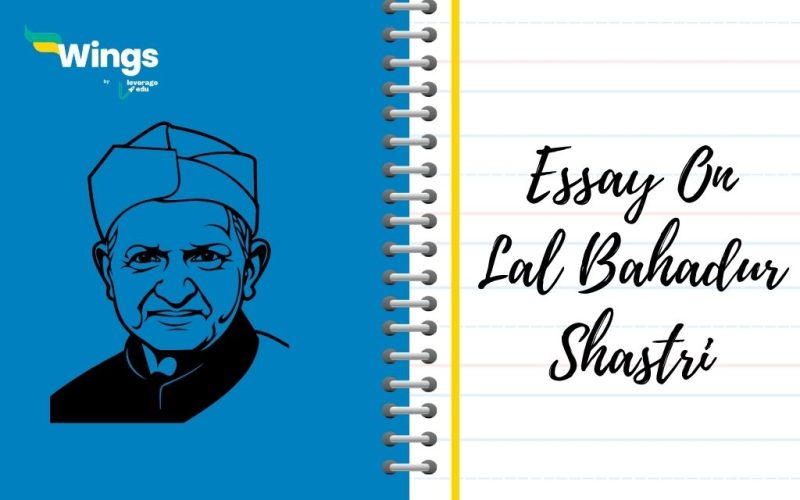Essay on Lal Bahadur Shastri: Lal Bahadur Shastri, the second Prime Minister of India who raised the slogan ¨Jai Jawan Jai Kisan¨ was one of the gems of Indian politics. As a responsible Prime Minister, he promoted Operation Flood, or White Revolution, which aimed to increase milk productivity in India. His contribution to the country’s independence from British colonial rule and later in shaping its post-independence destiny played an important role in the country’s struggle.
Lal Bahadur Shastri´s was rooted in Gandhian principles and his life was dedicated to public service. In this essay, we will explore his journey, important moments in life, and the lasting impact of his leadership on India’s development.
Also Read: My Experiments With Truth: Autobiography of Mahatma Gandhi
Essay on Lal Bahadur Shastri in 400 words
Lal Bahadur Shastri was born on October 2, 1904, in Mughalsarai, India. He emerged as a prominent figure in Indian politics during an important period in the nation’s history. He served as second Prime Minister of India from 1964 to 1966. Significant challenges and remarkable leadership marked his tenure.
Shastri Ji´s early life was deeply influenced by the Indian independence movement. During his childhood, he witnessed the struggles of ordinary Indians under British rule. Inspired by the ideals of Mahatma Gandhi, Lal Bahadur Shastri actively participated in non-violent resistance against colonialism. His commitment to social justice and equality helped to shape his political beliefs and laid the foundation for a career dedicated to the service of the nation.
Lal Bahadur Shastri´s political journey gained momentum as he joined the Indian National Congress. His dedication and grassroots approach helped him to earn the respect of party leaders and opened the door for key roles in the Indian government. Shashtri Ji´s tenure as Railway Minister in Jawaharlal Nehru´s cabinet showcased his administrative prowess, earning him acclaim for his efforts in improving the efficiency of the railway system.
Shastri Ji´s political career took a turning point in 1964 when he was appointed as the Prime Minister of India. He succeeded Jawaharlal Nehru and faced formidable challenges, including economic instability and the 1962 Indo-China War. These testing incidents displayed his quality of resilience, humility, and strategic thinking.
He recognized the crucial role of defence forces and the agricultural sector as national unity and self-sufficiency and therefore gave the famous slogan ¨Jai Jawan Jai Kisan¨ (Hail the Soldier, Hail the Farmer), which summarised his vision for a self-reliant and secure India.
In addition to his focus on national security and economic stability, Shastri Ji made important strides in encouraging diplomatic relations. His commitment to the Non-Aligned Movement, a coalition of nations not aligned with any major power bloc, highlighted India´s pursuit of an independent foreign policy. The aim of all such strengthening ties with other developing nations was to raise a sense of solidarity in the global ground.
Unfortunately, Lal Bahadur Shastri´s term as Prime Minister was cut short by his untimely death in Tashkent on January 11, 1966. Despite the shortness of his tenure, Lal Bahadur Shastri´s legacy was experienced as a symbol of integrity, simplicity, and effective governance.
In conclusion, Lal Bahadur Shastri´s contributions to Indian politics and governance are indelible. His journey from a modest background to the Prime Minister’s office is an example of his transformative power of dedication and principles. His legacy serves as an inspiration for leaders aspiring to create positive change through selfless service and a steadfast commitment to the well-being of the nation.
Also Read: Lal Bahadur Shastri Jayanti 2023: Honouring a Humble Hero
FAQs
Ans. Lal Bahadur Shastri was known as the ¨Peace Man of India¨ for his diplomatic efforts during the Indo-Pakistani War of 1965.
Ans. Lal Bahadur Shastri played an important role in the freedom movement through active participation in non-violent resistance.
Ans. The major contribution of Lal Bahadur Shastri includes successfully channelizing the challenges of the Indo-Pakistani War of 1965, signing the Tashkent Agreement for peace, and promoting the self-reliance and unity of India through his famous slogan ¨Jai Jawan Jai Kisan.¨
Ans. Lal Bahadur Shastri´s nickname was Man of Peace.
Ans. Lal Bahadur Shastri´s motto was Jai Jawan Jai Kisan (Hail the Soldier, Hail the Farmer)
Related Articles
For more information on such interesting topics, visit our essay writing page and follow Leverage Edu.
 One app for all your study abroad needs
One app for all your study abroad needs













